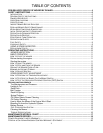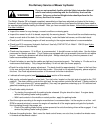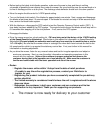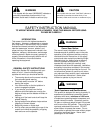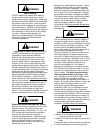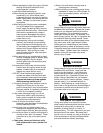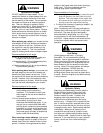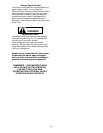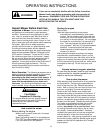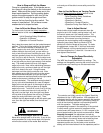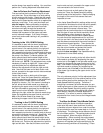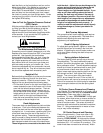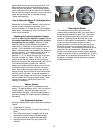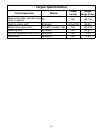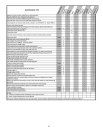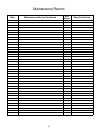
11
OPERATING INSTRUCTIONS
If you are not completely familiar with the Safety Instruction
Manual read it now before proceeding with the operation of
the mower. REMEMBER THERE ARE CERTAIN PRECAUTIONS
LISTED IN THIS MANUAL THAT YOU MUST NOW TAKE
BEFORE STARTING THE MOWER.
Inspect Mower Before Each Use
Inspection of Mower:
Do not use the mower if
any parts are not maintained in good operating
condition. Examine all moving parts prior to each
use. Look for excessive wear, bald drive tires or
worn out front tires (normally smooth), cracks in
parts, loose or missing bolts, cotter, linchpin or “hair”
pins or cable yoke pins and replace before operating
the mower. Make sure all safety equipment
provided with the mower is in good operating order,
including all warning decals and the operator-
presence device which stops the engine and blades
when the foot-operated Operator Presence Control
(OPC) switch is released. To test the OPC, follow
the instructions given later in this manual. Inspect
the two anti-tip rollers and their respective bolts at
the rear of the mower for tightness and proper
operation. Ensure that all parts of the Quad-Lever™
control system are tight and secure. This is to
reduce the possibility that the mower could have a
loss of control or safety.
Basic Operation:
The following procedures are to
guide you through the basic operation of the mower.
You should be a qualified mower operator
according to the safety section of this manual. If
this is your first time, operation should only be
done with the assistance of your dealer on a
level area. You should go through each step, in the
order indicated, every time you start the mower.
How to start the mower
Before starting the engine
• Make sure the control levers are in the exact
neutral position
• Apply the parking brake if it is not already set.
• Turn OFF the blade engaging switch if it is on.
• Turn fuel valve to the “ON” position.
Starting the engine
Electric Start:
•Start the engine according to the engine
manufacturer’s recommendation, see engine
manual. Set the throttle control lever near mid
throttle, pull out on the choke control knob and
turn the key to the start position. Do not engage
the starter for more than ten (10) seconds at a
time. This may overheat the starter and the
wiring systems. Wait ten (10) seconds between
attempts. If the engine does not start after
several attempts or stalls frequently, take the
mower in for service.
After starting the engine according to the engine
manufacturer’s recommendation, push in on the
choke control knob to open the choke valve, let the
engine run for several minutes to get the hydraulic
fluid circulating through the pumps, etc. and to allow
the engine to warm up. Do not over-rev a cold
engine.
Unusual noises or irregular operation:
As you drive the mower, listen for any unusual
noises and test for irregular operation and
adjust or service as necessary.
How to drive the mower
While standing, both feet should be firmly placed on
the foot platform. Set the engine speed about a
fourth of the way from idle. Release the parking
brake. Now try moving the hand control levers, one
at a time, very slightly, forward and backward.
Check to see if the wheels move forward and
backward according to the position of the levers. If
not, check to see that the pump release valves are
closed. With both feet still firmly placed on the foot
platform, increase the engine speed to about half of
the way from idle speed. Release the parking brake.
The higher engine speed will make the controls
much more responsive and the mower much
quicker; Use caution if it is your first time. Now
try moving the hand control levers, one at a time,
very slightly, forward and backward. Gradually
increase your speed until you are well acquainted
with the operation of the hand controls and the
mower’s behavior. After gaining a good feel for how
the mower handles, gradually attempt higher engine
speeds until familiar with operation at full throttle
engine speed.
WARNING
WARNING
CALIFORNIA
Proposition 65 Warning
The engine exhaust from this product contains
chemicals known to the state of California to
cause cancer, birth defects or other
reproductive harm.



